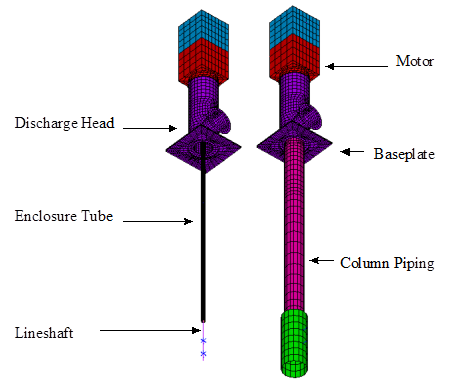Seismic Analysis Of A Vertical Turbine Pump
A nuclear power company purchased several new service water vertical turbine pumps for their power plant. As for all new nuclear installations, it needed to be shown that these pumps could withstand a standardized earthquake loading without structural failure. The pump manufacturer commissioned MSI to perform a three-dimensional finite element analysis to evaluate the response of the pumps to the earthquake. The 500 hp pumps ran at speeds of about 1200 rpm.
Finite element model of the vertical turbine pump.
MSI engineers modeled all the major components of the pumps including the discharge head, column shaft, caisson, motor casing, lineshaft, enclosure tube, baseplate, and pedestal foundation. The mass and inertia of the impellers and the motor rotor were also included. Lineshaft bearings, enclosure tube spiders, and motor bearings were modeled and given typical stiffness values. The effective added weight of the surrounding water was accounted for as well as the stiffening effect of the thrust load and enclosure tube pretension.
First, the natural frequencies were investigated and compared to frequencies of high seismic input as well as multiples of running speeds. No natural frequencies were found in the range of highest seismic input (about 5 Hz). The first below-ground reed frequencies were below this range and all other modes including the first above-ground modes were found to be above that range. An important finding was that some lateral bending modes were found near low multiples of running speed which indicated the need for design modification. The natural frequency investigation was then followed by the seismic analysis. A response spectrum method was employed. Site-specific seismic response spectra were applied simultaneously through the foundation of the pedestal support. The maximum seismic response was dominated by the first below-ground mode for all pumps. As the below-ground pipes flex, the peak stress appears at their ground level connection points. However, MSI was able to prove that these stress values as well as bearing loads were within acceptable limits.
MSI was able to demonstrate that the pumps could withstand the seismic loading and did so within an aggressive time frame. In addition, MSI made recommendations to prevent lateral lineshaft frequencies from resonating near the pump running speed, thus averting a potentially serious problem with pump operation.
REAL-WORLD EXAMPLES AND CASE STUDIES
MSI In Action
Case Study
A Cure for the Common Cold – in Turbines
A steam turbine at a waste-to-energy facility in the Northeast underwent a scheduled repair, at which time the turbine bearings were reworked, after which the turbine periodically experienced very high amplitude shaft vibrations.
Case Study
BFP Fluid Drive Troubleshooting
A boiler feed pump (BFP) driven off of the main steam turbine via a fluid drive was experiencing high vibration levels leading to frequent replacement of the fluid drive bearings.
Case Study
Aeroderivative Gas Turbine Modifications to Solve a Problem
MSI was contracted to understand and help solve a high vibration problem on an aero-derivative gas turbine driven generator.

